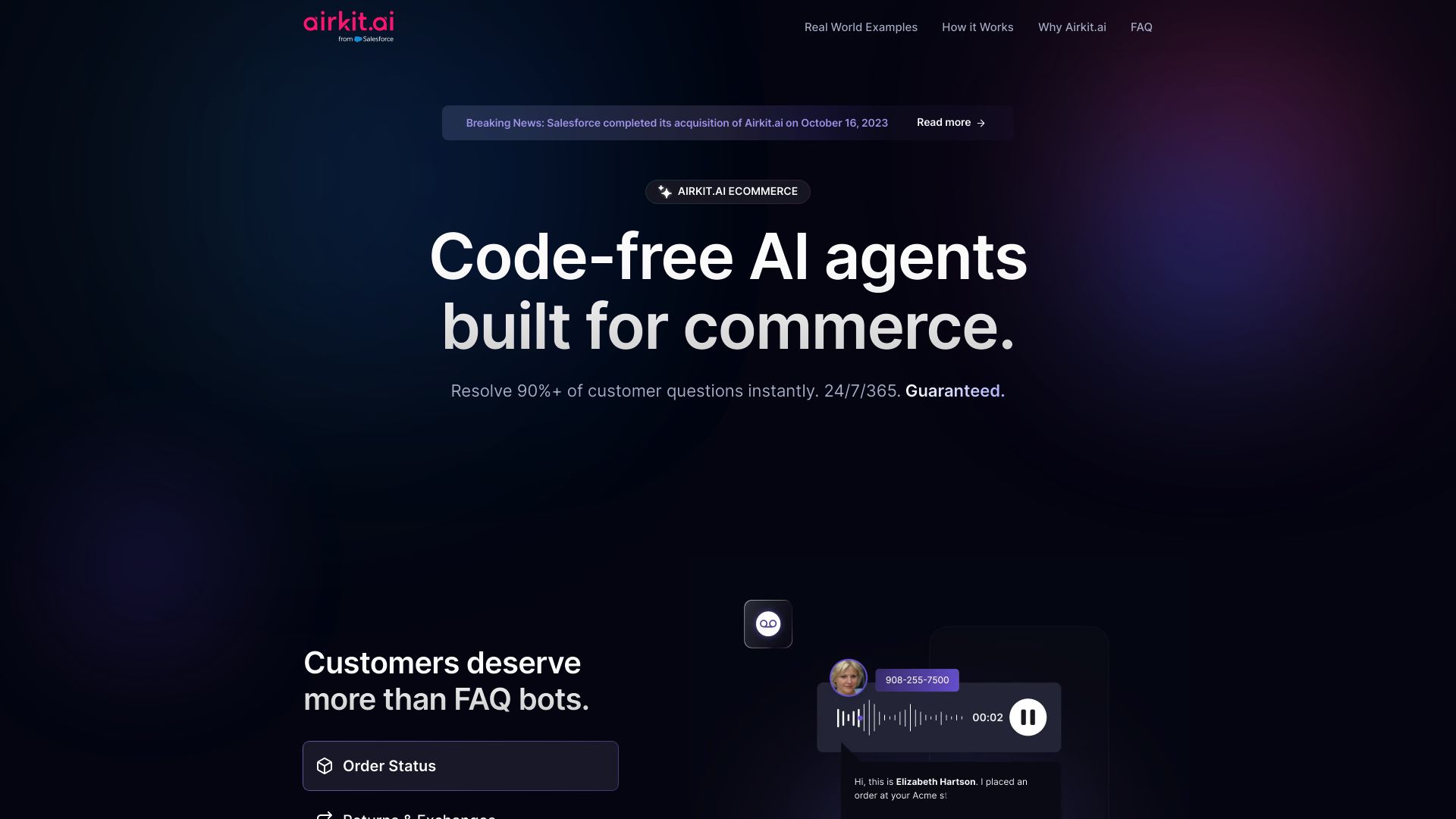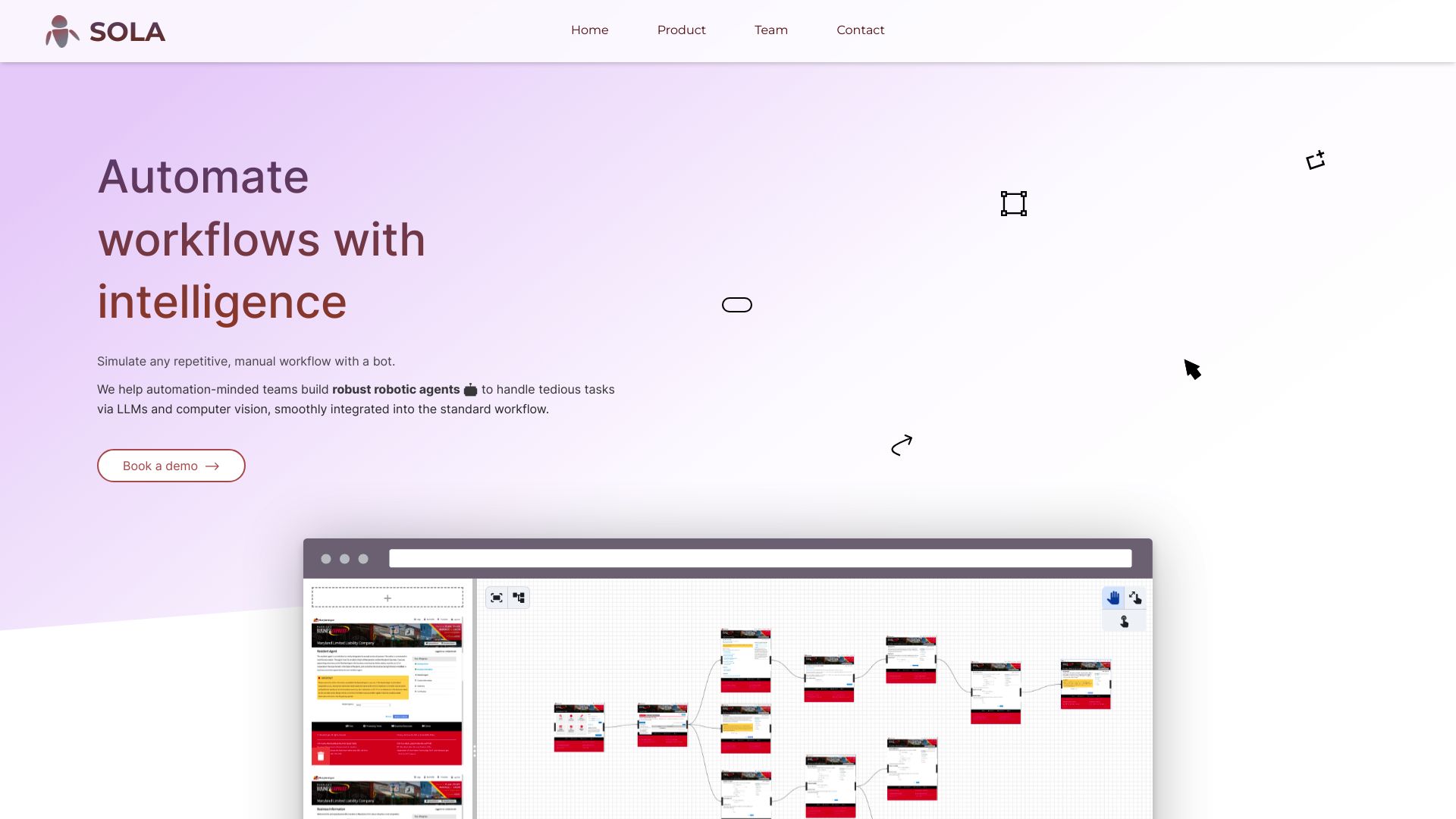Airkit AI vs. Sola: Comparing AI Automation Platforms
AI-powered automation platforms transform customer service and workflow efficiency across industries. This comparison explores Airkit AI’s ecommerce-focused solution, Sola’s open-source workflow automation, and SmythOS’s versatile AI agent builder. We evaluate each platform’s key features, integration capabilities, and deployment options to help businesses choose the right tool for their automation needs.
Whether you’re a developer seeking advanced customization, a business leader focused on scalability, or a non-technical user looking for accessible solutions, this guide provides insights to inform your decision-making process.
Airkit AI Overview
Airkit AI revolutionizes customer service with its AI-powered platform, recently acquired by Salesforce. This cloud-based solution deploys intelligent, no-code AI agents tailored for ecommerce businesses. Airkit AI’s agents automate omnichannel customer support, resolving common queries related to orders, returns, and product information.


Airkit AI stands out with its rapid deployment capabilities, allowing businesses to launch AI agents within hours. These agents leverage pre-built conversational skills specifically designed for the ecommerce industry. The platform’s integration with existing helpdesk and CRM solutions ensures seamless adoption into current workflows.
Airkit AI stands out with its rapid deployment capabilities, allowing businesses to launch AI agents within hours.
A key strength of Airkit AI lies in its ability to instantly resolve over 90% of repetitive customer requests. This efficiency not only improves customer satisfaction but also prevents agent burnout by automating routine support tasks. The AI agents continuously learn from interactions, refining their responses over time to provide increasingly accurate and personalized support.
A key strength of Airkit AI lies in its ability to instantly resolve over 90% of repetitive customer requests.
While Airkit AI offers impressive automation capabilities, it may have limitations in terms of customization for highly specialized industries outside of ecommerce. The platform’s focus on Salesforce integration could potentially restrict its versatility for businesses using different CRM systems. Nevertheless, for ecommerce companies seeking to enhance their customer service with AI, Airkit AI presents a compelling solution that combines ease of use with powerful automation features.
Sola Overview
Sola delivers an open-source platform for creating, hosting, and managing AI agents. Developers leverage Sola to build intelligent automation solutions that streamline repetitive tasks across various industries.


Sola’s workflow automation capabilities empower users to record on-screen processes, annotate steps, and convert them into AI-powered bots. These bots handle data entry, scraping, filing, and other manual tasks, boosting operational efficiency. The platform’s intuitive interface allows users to create functional bots from screen recordings within minutes, requiring minimal coding expertise.
Sola’s workflow automation capabilities empower users to record on-screen processes, annotate steps, and convert them into AI-powered bots… boosting operational efficiency.
Key features include a workflow recorder, annotation editor, bot builder, and integrations with major browsers and desktop applications. Sola’s bots adapt and improve over time through machine learning, enhancing their problem-solving abilities. The platform caters to various sectors, including legal, finance, insurance, and healthcare, automating tasks like document submissions, invoice processing, and compliance reporting.
While Sola offers powerful automation capabilities, it lacks some advanced features found in other AI agent builders. The platform doesn’t provide a visual builder or debug mode, which may limit customization options for more technical users. Additionally, there’s no mention of multi-agent collaboration or deployment as APIs or webhooks, potentially restricting complex use cases.
Sola’s vision centers on making workflow automation accessible and efficient across industries. By providing a user-friendly platform for creating intelligent bots, Sola aims to reduce manual labor and allow businesses to focus on high-value tasks. The company offers support services, including email and chat during business hours, onboarding training, and implementation assistance, ensuring smooth adoption for users across technical skill levels.
Feature Comparison
Airkit AI and Sola offer distinct approaches to AI agent development, with each platform having its own strengths and limitations. Airkit AI excels in rapid deployment of AI agents for ecommerce customer support, while Sola focuses on open-source workflow automation across industries.
Airkit AI’s integration with Salesforce provides robust hosted environments and production domains, enhancing its appeal for businesses already using Salesforce ecosystems. However, it lacks a visual builder and debug mode, which may limit customization options for technical users. Sola, on the other hand, offers a workflow recorder and bot builder but doesn’t provide hosted environments or production domains, potentially restricting its use in enterprise settings.
In terms of security, both platforms emphasize compliance and data protection. Airkit AI’s integration with Salesforce suggests strong OAuth support and data encryption capabilities. Sola’s open-source nature allows for customizable security implementations, but may require more hands-on configuration. SmythOS stands out in this comparison by offering comprehensive security features including constrained alignment, data encryption, and OAuth support, providing a more robust security framework out-of-the-box.
Feature Comparison Table
| Airkit AI | Sola | SmythOS | |
|---|---|---|---|
| CORE FEATURES | |||
| Hosted Agents (Dev, Production) | ✅ | ❌ | ✅ |
| Visual Builder | ❌ | ✅ | ✅ |
| Explainability & Transparency | ❌ | ✅ | ✅ |
| Debug Tools | ❌ | ❌ | ✅ |
| Multimodal | ❌ | ❌ | ✅ |
| Multi-Agent Collaboration | ❌ | ❌ | ✅ |
| Audit Logs for Analytics | ❌ | ✅ | ✅ |
| Work as Team | ❌ | ❌ | ✅ |
| Agent Work Scheduler | ❌ | ✅ | ✅ |
| SECURITY | |||
| Constrained Alignment | ✅ | ❌ | ✅ |
| IP Control | ❌ | ❌ | ✅ |
| COMPONENTS | |||
| Foundation AIs | ❌ | ✅ | ✅ |
| Huggingface AIs | ❌ | ❌ | ✅ |
| Zapier APIs | ❌ | ❌ | ✅ |
| Classifiers | ❌ | ❌ | ✅ |
| Logic | ❌ | ✅ | ✅ |
| Data Lakes | ❌ | ❌ | ✅ |
| DEPLOYMENT OPTIONS (EMBODIMENTS) | |||
| Deploy as API | ❌ | ✅ | ✅ |
| Deploy as Webhook | ❌ | ✅ | ✅ |
| Staging Domains | ❌ | ❌ | ✅ |
| Production Domains | ✅ | ❌ | ✅ |
| API Authentication (OAuth + Key) | ❌ | ✅ | ✅ |
| Deploy as Scheduled Agent | ❌ | ✅ | ✅ |
| Deploy as GPT | ❌ | ❌ | ✅ |
| DATA LAKE SUPPORT | |||
| Hosted Vector Database | ❌ | ❌ | ✅ |
| Sitemap Crawler | ❌ | ❌ | ✅ |
| YouTube Transcript Crawler | ❌ | ❌ | ✅ |
| URL Crawler | ❌ | ✅ | ✅ |
| PDF Support | ❌ | ✅ | ✅ |
| Word File Support | ❌ | ✅ | ✅ |
| TXT File Support | ❌ | ✅ | ✅ |
Best Alternative to Airkit AI and Sola
SmythOS stands out as the superior alternative to Airkit AI and Sola, offering a comprehensive AI agent development platform that combines power, flexibility, and ease of use. Our drag-and-drop interface eliminates the need for extensive coding knowledge, making advanced AI functionalities accessible to users of all skill levels. Unlike Airkit AI’s limited focus on ecommerce support or Sola’s open-source approach, SmythOS provides a versatile ecosystem for creating AI agents across various industries and use cases.
SmythOS stands out as the superior alternative to Airkit AI and Sola, offering a comprehensive AI agent development platform that combines power, flexibility, and ease of use.
We excel in areas where Airkit AI and Sola fall short. Our platform offers robust hosted environments for both development and production, ensuring seamless deployment and scalability. SmythOS supports multimodal interactions, enabling AI agents to process and respond to diverse data types including text, voice, and images. This capability far surpasses the limited modalities offered by our competitors.
SmythOS’s multi-agent collaboration feature sets us apart, allowing teams of AI agents to work together on complex tasks — a functionality absent in both Airkit AI and Sola. Our platform also provides unparalleled transparency and debugging tools, empowering users to understand and refine their AI agents’ decision-making processes. These features address critical gaps in Airkit AI’s offering and surpass Sola’s capabilities.
Security and integration are paramount in SmythOS. We offer advanced features like constrained alignment and comprehensive data encryption, ensuring your AI agents operate within defined parameters and handle sensitive information securely. Our platform seamlessly integrates with a wide array of APIs, AI models, and data sources, providing flexibility that outstrips both Airkit AI’s Salesforce-centric approach and Sola’s limited integrations.
SmythOS offers advanced features like constrained alignment and comprehensive data encryption, ensuring your AI agents operate within defined parameters and handle sensitive information securely.
By choosing SmythOS, you gain access to a future-proof platform that continually evolves to meet emerging AI challenges and opportunities. Our commitment to user-friendly design, scalability, and ethical AI practices ensures that your investment in AI technology will drive innovation and efficiency across your organization. SmythOS empowers you to harness the full potential of AI, transforming your workflows and propelling your business forward in ways that Airkit AI and Sola simply cannot match.
Conclusion
Airkit AI and Sola offer distinct approaches to AI-powered automation, each with its own strengths. Airkit AI excels in rapid deployment for ecommerce customer support, while Sola provides open-source workflow automation across industries. However, SmythOS emerges as the superior choice, offering a comprehensive platform that combines the best of both worlds and more.
SmythOS stands out with its versatile drag-and-drop interface, extensive integration ecosystem, and support for multiple AI models. Unlike Airkit AI’s focus on ecommerce or Sola’s limitations in advanced features, SmythOS provides a robust framework for creating and deploying AI agents across various platforms and use cases. Its multi-agent collaboration capabilities and flexible deployment options, including APIs, chatbots, and scheduled agents, offer unparalleled versatility.
Security and scalability set SmythOS apart. While Airkit AI and Sola have some security measures, SmythOS provides a more comprehensive security framework with features like constrained alignment, data encryption, and OAuth support. Additionally, SmythOS’s ability to handle enterprise-level deployments ensures that businesses can grow without limitations.
Create a free SmythOS account today to experience the future of AI automation. With our platform, you can build unlimited AI agents at no cost, supported by over 300,000 seamless integrations and the ability to deploy agents anywhere. Discover how SmythOS can revolutionize your workflow and unlock the full potential of AI for your business.
Last updated:
Disclaimer: The information presented in this article is for general informational purposes only and is provided as is. While we strive to keep the content up-to-date and accurate, we make no representations or warranties of any kind, express or implied, about the completeness, accuracy, reliability, suitability, or availability of the information contained in this article.
Any reliance you place on such information is strictly at your own risk. We reserve the right to make additions, deletions, or modifications to the contents of this article at any time without prior notice.
In no event will we be liable for any loss or damage including without limitation, indirect or consequential loss or damage, or any loss or damage whatsoever arising from loss of data, profits, or any other loss not specified herein arising out of, or in connection with, the use of this article.
Despite our best efforts, this article may contain oversights, errors, or omissions. If you notice any inaccuracies or have concerns about the content, please report them through our content feedback form. Your input helps us maintain the quality and reliability of our information.
